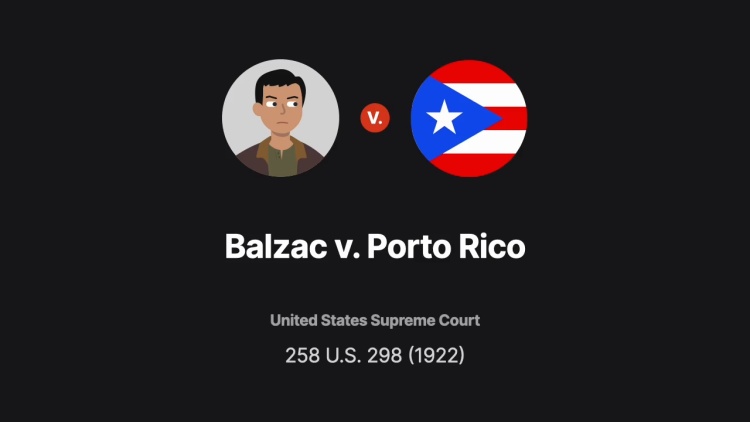Balzac v. Porto Rico
United States Supreme Court
258 U.S. 298 (1922)
- Written by Kyli Cotten, JD
Facts
Jesus Balzac (defendant) was the editor of a Puerto Rican newspaper. Balzac was charged by the Puerto Rican government (plaintiff) for criminal libel for publishing allegedly libelous articles. All of the charges brought by the government were misdemeanors. Balzac demanded a jury trial under the Sixth Amendment to the United States Constitution and further claimed that the speech charged as libel was protected by the First Amendment. Because the Code of Criminal Procedure of Puerto Rico granted jury trials only for felonies, Balzac’s claims were overruled. Balzac’s case was tried before a judge, and he was convicted and sentenced to serve prison time. On appeal to the Supreme Court of Puerto Rico, Balzac argued that when the United States Congress passed the Jones Act, it implied an intent to adopt Puerto Rico into the Union. The Jones Act provided a Bill of Rights to the citizens of Puerto Rico that largely mirrored the United States Bill of Rights, but without the right to trial by jury. The Supreme Court of Puerto Rico ultimately affirmed the lower court’s judgment. Balzac appealed.
Rule of Law
Issue
Holding and Reasoning (Taft, C.J.)
What to do next…
Here's why 907,000 law students have relied on our case briefs:
- Written by law professors and practitioners, not other law students. 47,100 briefs, keyed to 996 casebooks. Top-notch customer support.
- The right amount of information, includes the facts, issues, rule of law, holding and reasoning, and any concurrences and dissents.
- Access in your classes, works on your mobile and tablet. Massive library of related video lessons and high quality multiple-choice questions.
- Easy to use, uniform format for every case brief. Written in plain English, not in legalese. Our briefs summarize and simplify; they don’t just repeat the court’s language.





